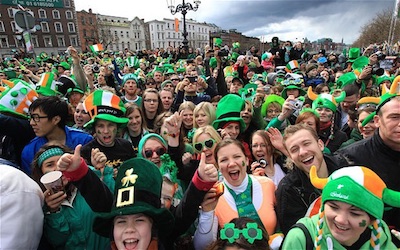
A St Patrick’s Day parade in Scotland is facing cancellation because it could be attacked by loyalists, according to reports this week.
The St Patrick’s Day parade next month in Glasgow is being opposed because of official “nervousness” about the response of loyalists and the anti-Catholic Orange Order.
The “nervousness” is contained in a report drawn up by the British/Irish Parliamentary Assembly (BIPA), which has controversially urged that symbols of Irishness in Scotland be suppressed over fears of a sectarian response.
BIPA is comprised of parliamentarians from both the Dublin, London and Edinburgh parliaments, as well as members of the Welsh and Stormont Assemblies.
Its draft report warned that symbols of Irishness could be “demonised by sectarianism”. It revealed that at least two Irish centers in Scotland have been burned down in sectarian attacks, and suggested the centers were at fault for exhibiting excessive Irishness.
Some Irish community organisations were regarded as “troublemakers”, it said, and Irish songs and symbols were “contentious”.
A committee of members produced the document, but it was not adopted by the full Assembly after some Scottish members said that it was inflammatory -- to unionists.
Mary Scanlon, a Scottish Conservative and Unionist, objected to labelling the Irish in Scotland as a minority, which she claimed was “divisive”.
“I am a unionist for the UK. We have just come out of the most divisive election ever in the history of my time in Scotland,” she said.
Labour MP for Paisley and Renfrewshire North Jim Sheridan said the Irish should not be regarded as a minority and insisted public money must not be spent on a St Patrick’s Day march in Glasgow.
“People need to look forward, move forward and think of a modern Scotland and stop living in the past,” he said.
![[Irish Republican News]](https://republican-news.org/graphics/title_gifs/rn.gif)
![[Irish Republican News]](https://republican-news.org/graphics/title_gifs/harp.gif)

